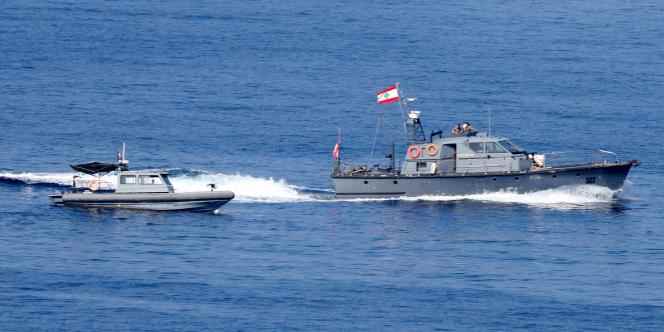Lebanon and Israel – two neighboring countries officially in a state of war – are due to sign an agreement on Thursday, October 27, delimiting their maritime border after months of arduous negotiations through the United States. This text ensures the distribution of precious offshore gas deposits in the eastern Mediterranean.
US President Joe Biden welcomed the imminent signing of the agreement on Wednesday. “historical”pointing out that it “it took a lot of courage to get involved”.
“This is a political achievement, it is not every day that an enemy state recognizes the State of Israel in a written agreement and this, in front of the entire international community”declared the Israeli Prime Minister, Yaïr Lapid, at the start of a special Council of Ministers which must officially ratify the agreement. “The State of Israel has won today in terms of security, economy, diplomacy and energy”added Mr. Lapid, currently campaigning for the legislative elections of 1er november. In a tweet, Lebanese President Michel Aoun replied that it was a purely “technical”without any “political aspect”neither “consequences that contradict Lebanon’s foreign policy”.
The agreement is to be signed in the afternoon at the headquarters of the United Nations Interim Force for Lebanon (UNIFIL), in the Lebanese border town of Naqoura, in the presence of the American mediator, Amos Hochstein, and the special coordinator of the United Nations in Lebanon, Joanna Wronecka. “The maritime border agreement will take the form of two exchanges of letters, one between Lebanon and the United States and the other between Israel and the United States”detailed the spokesperson for the Secretary General of the United Nations, Stephane Dujarric.
Lebanon refuses that its delegation finds itself in the same room as that of Israel and that they sign the same text, the two neighboring countries being, technically, in a state of war. The Lebanese delegation will have the sole mission of “deliver the letter in the presence of Amos Hochstein and the UN representative, and will not meet the Israeli delegation in any way”underlined the spokesman of the Lebanese presidency, Rafic Chelala.
Stuck in political tensions which are accentuated a few days before the end of the mandate of the president, Michel Aoun, without a successor being found for him, Lebanon had not yet announced Thursday morning the composition of its delegation. For its part, the Israeli government must officially ratify the agreement Thursday morning.
“Eliminate a war”
The agreement, which will allow the two countries to exploit gas fields in the eastern Mediterranean, was reached thanks to years of American mediation.
Under the agreement, the offshore Karish field lies entirely within Israeli waters. Lebanon, for its part, will have full exploration and exploitation rights to the Cana field, located further northeast, part of which lies in Israeli territorial waters. But “Israel will be remunerated” by the firm operating Cana “for its rights to possible deposits”according to the text, Mr. Lapid quantifying the Israeli share at around 17%.
Amos Hochstein, who negotiated this agreement, met the Lebanese president on Wednesday morning in Beirut. He welcomed in a statement to the press a “historic day” and believed that the agreement made it possible to create “economic opportunities” and to establish ” stability “ for both parties.
Without even waiting for the signature, the energy group Energean launched the production of natural gas on the Karish deposit on Wednesday. The Israeli government had given the company the green light the day before to begin production on this deposit. Lebanon, which is sinking into an unprecedented economic crisis, has for its part asked TotalEnergies to quickly begin prospecting work in the Cana field.
“The purpose of the agreement (…) is to eliminate as much as possible the possibility of a maritime war between Israel and Lebanon”former US negotiator Frédéric Hof said on Wednesday.
The agreement could not have been signed without the consent of the powerful pro-Iranian Hezbollah in Lebanon, which had threatened over the summer to attack Israel if the Jewish state began extracting gas from the field of Karish before a deal was struck.
